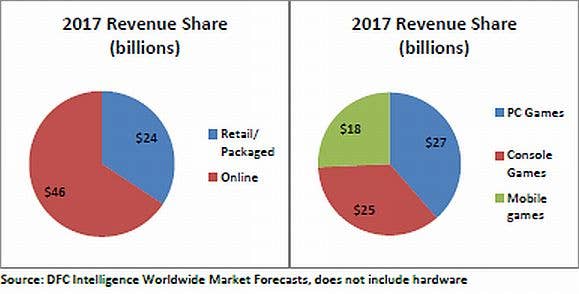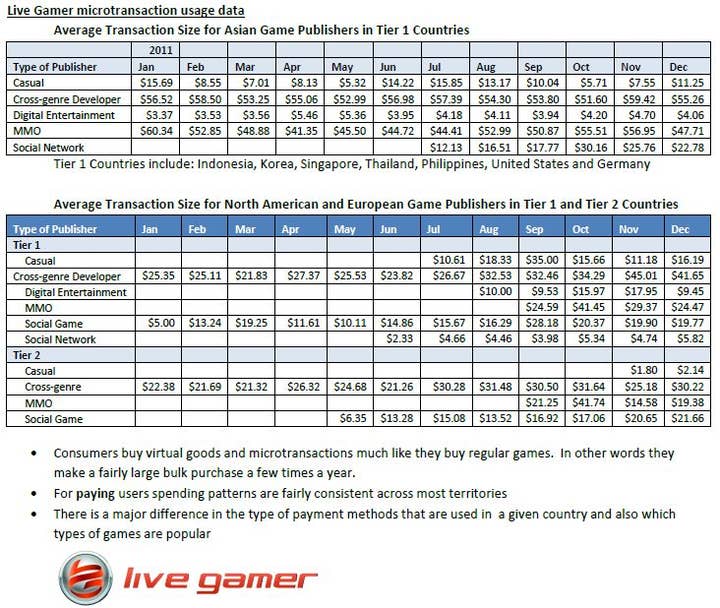Global Gaming Market: "Console is not dead"
Data and opinions from analysts and execs on the present and future of global gaming
While E3 gathers the most attention for new games, new hardware, and impressive marketing feats, the most valuable parts of the show for many insiders happen away from the bright lights. At a breakfast meeting during E3, David Cole of DFC Intelligence gathered together opinion leaders and industry executives to explore where the global gaming market is at and where it's headed.
Cole's key insights into the global game market:
Console is not dead even if it is not as strong
Retail is still very important and builds excitement and sells hardware
Understanding the different segments and their demographics and business models is crucial
"It is the 12-30 year old male that drives core gaming," noted David Cole. "What are they doing? If their gaming habits change, it can have a huge impact on the market." Cole went on to discuss other important facts about core gamers :They own multiple platforms, they are open to digital distribution (81 percent have bought from Steam, and 46 percent from Origin), and they are not big fans of Facebook games (86 percent use Facebook but only 13 percent said they would pay for Facebook games).
"It is the 12-30 year old male that drives core gaming"
David Cole
Globally, the PC platform is broadest, according to Cole's data. He projected that even in 2017 that PC games will still have the greatest share of global game revenue at $27 billion, followed closely by console games at $25 billion, with mobile games accounting for $18 billion. "There's great data out there on consoles, but not such good data in the PC space," said Cole. DFC therefore looks to partner with people who have good data, such as Xfire (social network for gamers with 22 million users) and Live Gamer (which provides a micropayment platform to 95 million users worldwide).

Xfire is focusing on Asia now, says CEO Malcolm CasSelle. "The opportunity for Xfire in China is vast, with more than 400 million online gamers, said CasSelle. He sees China as an excellent opportunity for Xfire. "China is relatively untapped as far as in-game social services go, so we're putting a major push behind building our offerings there," noted CasSelle. "We have a number of non-ad revenue streams that are in R&D, and will roll out later this year."
CasSelle sees major changes in the game industry. "There's been a great resurgence in PC gaming for the past several years. League of Legends, World of Tanks, Diablo III…all these PC-exclusive titles are helping to swing the needle back to center in the console/PC spectrum," said CasSelle.
"The dominance of free-to-play titles in the global markets is astounding"
Malcolm CasSelle
"The dominance of free-to-play titles in the global markets is astounding," said CasSelle. "The free-to-play model is disrupting the marketplace by lowering cost to enter for game developers, changing the entire business for game publishers, and drastically reducing the value platforms like Steam bring to the table with their digital rights management (DRM) solutions."
Jeremy Miller of DFC noted that the most popular PC games now are Minecraft, with about 500,000 Daily Active Users (DAU), League of Legends with 1 million DAU, and Diablo III, which peaked soon after launch at over 1 million DAU but has since dropped back LoL gets 1 million AU per day. Diablo III has been the biggest hit on PC for several years, but it's also interesting to note that League of Legends players average 3.5 to 4 hours per day.

Andy Scarborough, Strategic Client Services Manager at the Live Gamer micropayment platform, noted that gamers are monetizing well in Europe and emerging markets. "Customers getting more comfortable with payments," said Scarborough. "That means lots of potential for micropayment expansion, especially on console, which can help other types of payment too." He provided very interesting data on game payments from around the world, in the charts reproduced here.
Dusty Welch, co-founder of U4iA, is especially bullish on smartphones and tablets. Globally smartphones are still in their infancy, even with hundreds of millions already in the market. "Mobile is important especially in emerging markets," Welch said. Opportunity exists in other areas too, as Welch noted: "Consoles have siloed, so there is opportunity to connect experiences between platforms." There's a vast array of choices in front of developers, but Welch advocates a continued focus the game. "Always be connected to your gameplay experience," said Welch. Advice that some companies seem to forget as they focus on the metrics.

